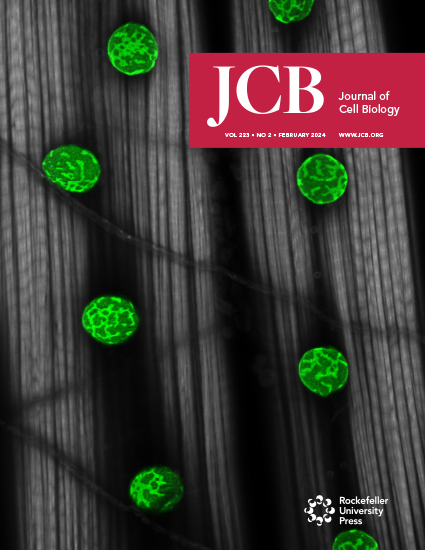p97 atp酶及其接头UBXD8通过防止噬酶来维持过氧化物酶体池。
IF 6.4
1区 生物学
Q1 CELL BIOLOGY
引用次数: 0
摘要
过氧化物酶体在真核细胞中发挥关键的代谢功能。过氧化物酶体功能的丧失导致过氧化物酶体生物发生障碍和严重的儿童疾病,伴有脂质代谢紊乱。调节过氧化物酶体丰度的一种机制是通过选择性自噬(pexophagy)降解。然而,哺乳动物细胞中调节食腐的机制仍然知之甚少。在这里,我们发现进化上保守的aaa - atp酶p97/VCP及其适配器UBXD8/FAF2对于维持过氧化物酶体的丰度至关重要。从定量蛋白质组学研究中,我们发现UBXD8的缺失会影响许多过氧化物酶体蛋白的丰度,而UBXD8的缺失会导致过氧化物酶体的缺失。p97- ubxd8的缺失和p97催化活性的抑制会通过自噬增加过氧化物酶体的更新,并且可以通过耗尽关键的自噬蛋白和E3连接酶或过表达去泛素化酶USP30来拯救。我们发现在缺乏UBXD8或p97的细胞中,PMP70和PEX5的泛素化增加。我们的研究发现p97-UBXD8通过去除泛素化的过氧化物酶体膜蛋白来调节过氧化物酶体的丰度,从而防止过氧化物酶体吞噬。本文章由计算机程序翻译,如有差异,请以英文原文为准。
The p97 ATPase and its adaptor UBXD8 maintain peroxisome pools by preventing pexophagy.
Peroxisomes perform key metabolic functions in eukaryotic cells. Loss of peroxisome function causes peroxisome biogenesis disorders and severe childhood diseases with disrupted lipid metabolism. One mechanism regulating peroxisome abundance is degradation via selective autophagy (pexophagy). However, the mechanisms regulating pexophagy remain poorly understood in mammalian cells. Here, we find that the evolutionarily conserved AAA-ATPase p97/VCP and its adaptor UBXD8/FAF2 are essential for maintaining peroxisome abundance. From quantitative proteomics studies, we show that loss of UBXD8 affects the abundance of many peroxisomal proteins and that the depletion of UBXD8 results in a loss of peroxisomes. Loss of p97-UBXD8 and inhibition of p97 catalytic activity increase peroxisomal turnover through autophagy and can be rescued by depleting key autophagy proteins and E3 ligases or overexpressing the deubiquitylase USP30. We find increased ubiquitylation of PMP70 and PEX5 in cells lacking UBXD8 or p97. Our findings identify a new role of the p97-UBXD8 in regulating peroxisome abundance by removing ubiquitylated peroxisome membrane proteins to prevent pexophagy.
求助全文
通过发布文献求助,成功后即可免费获取论文全文。
去求助
来源期刊

Journal of Cell Biology
生物-细胞生物学
CiteScore
12.60
自引率
2.60%
发文量
213
审稿时长
1 months
期刊介绍:
The Journal of Cell Biology (JCB) is a comprehensive journal dedicated to publishing original discoveries across all realms of cell biology. We invite papers presenting novel cellular or molecular advancements in various domains of basic cell biology, along with applied cell biology research in diverse systems such as immunology, neurobiology, metabolism, virology, developmental biology, and plant biology. We enthusiastically welcome submissions showcasing significant findings of interest to cell biologists, irrespective of the experimental approach.
 求助内容:
求助内容: 应助结果提醒方式:
应助结果提醒方式:


